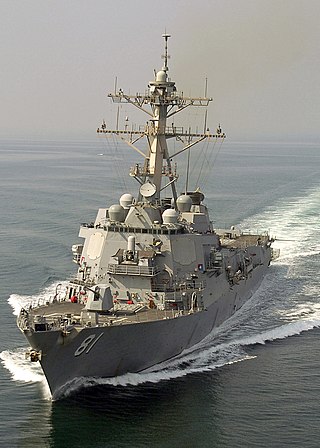
In naval terminology, a destroyer is a fast, maneuverable, long-endurance warship intended to escort larger vessels in a fleet, convoy, or battle group and defend them against powerful short-range attackers. They were originally developed in 1885 by Fernando Villaamil for the Spanish Navy as a defense against torpedo boats, and by the time of the Russo-Japanese War in 1904, these "torpedo boat destroyers" (TBDs) were "large, swift, and powerfully armed torpedo boats designed to destroy other torpedo boats". Although the term "destroyer" had been used interchangeably with "TBD" and "torpedo boat destroyer" by navies since 1892, the term "torpedo boat destroyer" had been generally shortened to simply "destroyer" by nearly all navies by the First World War.

A torpedo boat is a relatively small and fast naval ship designed to carry torpedoes into battle. The first designs were steam-powered craft dedicated to ramming enemy ships with explosive spar torpedoes. Later evolutions launched variants of self-propelled Whitehead torpedoes.

A corvette is a small warship. It is traditionally the smallest class of vessel considered to be a proper warship. The warship class above the corvette is that of the frigate, while the class below was historically that of the sloop-of-war.
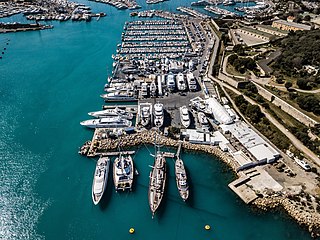
A shipyard, also called a dockyard or boatyard, is a place where ships are built and repaired. These can be yachts, military vessels, cruise liners or other cargo or passenger ships. Compared to shipyards, which are sometimes more involved with original construction, dockyards are sometimes more linked with maintenance and basing activities. The terms are routinely used interchangeably, in part because the evolution of dockyards and shipyards has often caused them to change or merge roles.

A warship or combatant ship is a naval ship that is built and primarily intended for naval warfare. Usually they belong to the armed forces of a state. As well as being armed, warships are designed to withstand damage and are typically faster and more maneuverable than merchant ships. Unlike a merchant ship, which carries cargo, a warship typically carries only weapons, ammunition and supplies for its crew. Warships usually belong to a navy, though they have also been operated by individuals, cooperatives and corporations.
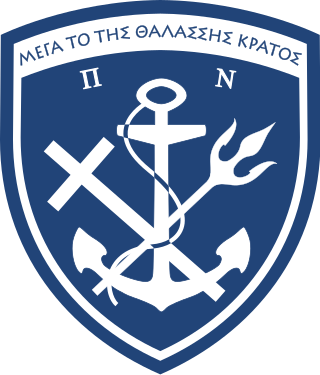
The Hellenic Navy is the naval force of Greece, part of the Hellenic Armed Forces. The modern Greek navy historically hails from the naval forces of various Aegean Islands, which fought in the Greek War of Independence. During the periods of monarchy it was known as the Royal Hellenic Navy.

A patrol boat is a relatively small naval vessel generally designed for coastal defence, border security, or law enforcement. There are many designs for patrol boats, and they generally range in size. They may be operated by a nation's navy, coast guard, police, or customs, and may be intended for marine, estuarine, or river environments.

The Romanian Naval Forces is the principal naval branch of the Romanian Armed Forces and operates in the Black Sea and on the Danube. It traces its history back to 1860.

Howaldtswerke-Deutsche Werft is a German shipbuilding company, headquartered in Kiel. It is part of the ThyssenKrupp Marine Systems (TKMS) group, owned by ThyssenKrupp. The Howaldtswerke shipyard was founded in Kiel in 1838 and merged with Hamburg-based Deutsche Werft to form Howaldtswerke-Deutsche Werft (HDW) in 1968. The company's shipyard was formerly used by Friedrich Krupp Germaniawerft until the end of World War II.
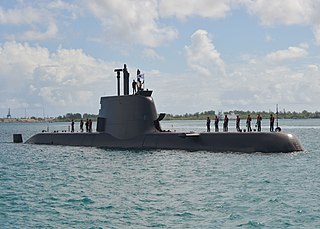
The Type 214 is a class of diesel-electric submarine developed exclusively for export by Howaldtswerke-Deutsche Werft GmbH (HDW). It features diesel propulsion with an air-independent propulsion (AIP) system using Siemens polymer electrolyte membrane (PEM) hydrogen fuel cells. The class combines the design principles of the Type 209 submarine family and the features of the Type 212A submarine. However, as an export design, it lacks some of the classified technologies of the Type 212 such as the non-magnetic steel hull that makes it difficult to detect using a magnetic anomaly detector.
The History of the Hellenic Navy begins with the birth of modern Greece, and due to the maritime nature of the country, this force has been the premier service of the Greek Armed Forces.

The Shishumar-class submarines are diesel-electric attack submarines, currently in active service with the Indian Navy. These submarines are an Indian variant of the Type 209 submarines developed by the German yard Howaldtswerke-Deutsche Werft under the internal designation "Type 1500". The first two vessels were built by HDW at Kiel, Germany, while the remainder were built by Mazagon Dock Limited, at Mumbai, India, under a technology transfer agreement. The submarines were commissioned between 1986 and 1994. These submarines have a displacement of 1,660 tons when surfaced, a speed of 22 knots, and a complement of 40 including eight officers.
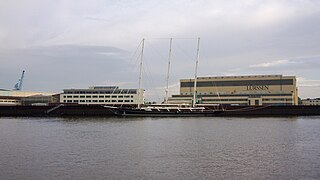
Lürssen is a German shipyard with headquarters in Bremen-Vegesack and shipbuilding facilities in Lemwerder, Berne and Bremen-Fähr-Lobbendorf.
Antony Preston was an English naval historian and editor, specialising in the area of 19th and 20th-century naval history and warship design.

The Osprey 55-class gunboat is a Danish-designed class of naval ship currently in service in the Hellenic Navy and Royal Moroccan Navy. Two ships were ordered by Greece in March 1988 and built by Hellenic Shipyards. The first one was laid down on 8 May 1989 and launched on 19 December 1989. The second ship was laid down on 9 November 1989 and launched on 16 May 1990. Armament is of modular design and therefore can be changed. 76-millimetre (3 in) guns replaced the Bofors 40 mm (1.6 in) guns in 1995, after being taken from decommissioned Gearing-class destroyers. Options on more of the class were shelved in favour of the slightly larger HSY-55 class.

The HSY-55-class gunboat is a class of naval vessel designed by the Hellenic Navy and built by Hellenic Shipyards (HSY). This class of ship uses the modular concept so that weapons and sensors can be changed as required. These vessels are similar in appearance to Osprey 55-class gunboat. The first pair was ordered on 20 February 1990, but completion was delayed by the shipyard's financial problems. Pyrpolitis (P57) was launched on 16 September 1992, and Polemistis (P61) on 21 June 1993. Each ship can carry 25 fully equipped troops. Alternative guns and Harpoon SSM can be fitted as required.

The Osprey HSY-56A-class gunboat is a class of naval vessel currently in service in the Hellenic Navy. These ships are similar to HSY-55-class gunboat and were also built by Hellenic Shipyards (HSY). They are the most modern patrol vessels of Hellenic Navy. The first ship of the class named Machitis was commissioned on 29 October 2003. In 2018 all of the four ships of the class are in active service.

The Roussen class is a seven-strong class of British-designed fast attack missile boats improved and customized for the Hellenic Navy, also known as Super Vita. The class is named after its lead ship, which in turn is named after Lt Nikolaos Roussen, a World War II submarines officer who was killed in the suppression of the Navy mutiny in April 1944.
Abu Dhabi MAR (ADM), a holding company based in Abu Dhabi, UAE; is a shipbuilding group with an international presence, and one of the leading shipbuilders in the Persian Gulf.
















